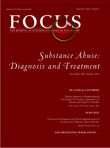Causal Association Between Cannabis and Psychosis: Examination of the Evidence
Abstract
Background:
Controversy remains as to whether cannabis acts as a causal risk factor for schizophrenia or other functional psychotic illnesses. Aims: To examine critically the evidence that cannabis causes psychosis using established criteria of causality. Method: We identified five studies that included a well-defined sample drawn from population-based registers or cohorts and used prospective measures of cannabis use and adult psychosis. Results: On an individual level, cannabis use confers an overall twofold increase in the relative risk for later schizophrenia. At the population level, elimination of cannabis use would reduce the incidence of schizophrenia by approximately 8%, assuming a causal relationship. Cannabis use appears to be neither a sufficient nor a necessary cause for psychosis. It is a component cause, part of a complex constellation of factors leading to psychosis. Conclusions: Cases of psychotic disorder could be prevented by discouraging cannabis use among vulnerable youths. Research is needed to understand the mechanisms by which cannabis causes psychosis.
(Reprinted with permission from the British Journal of Psychiatry 2004; 184:110–117)



